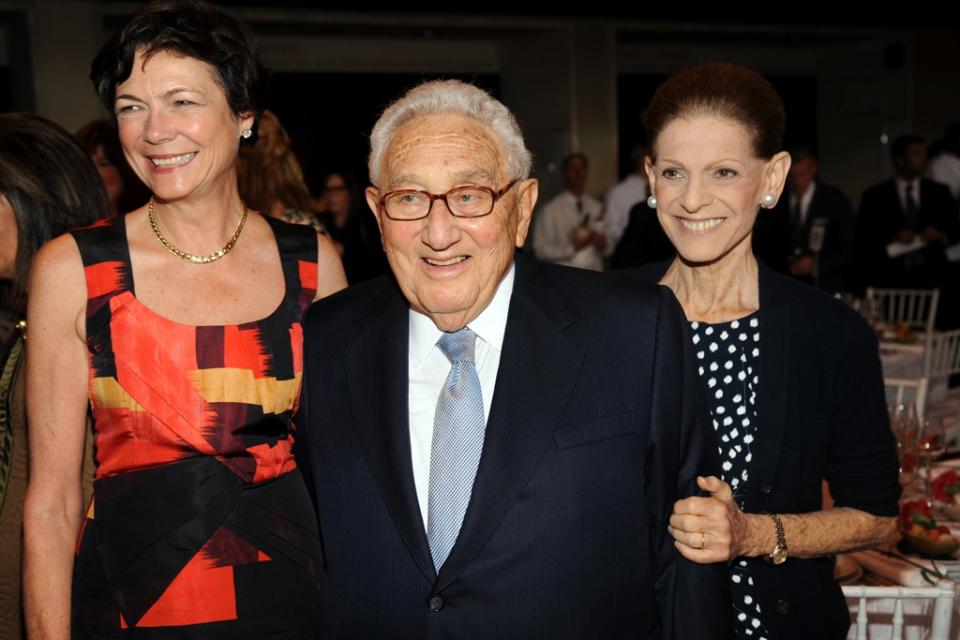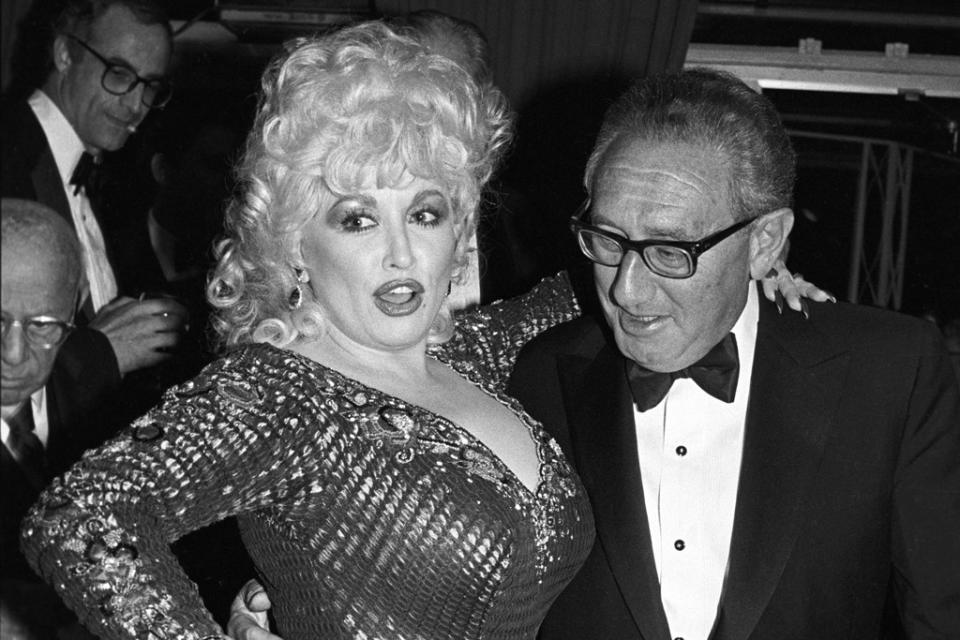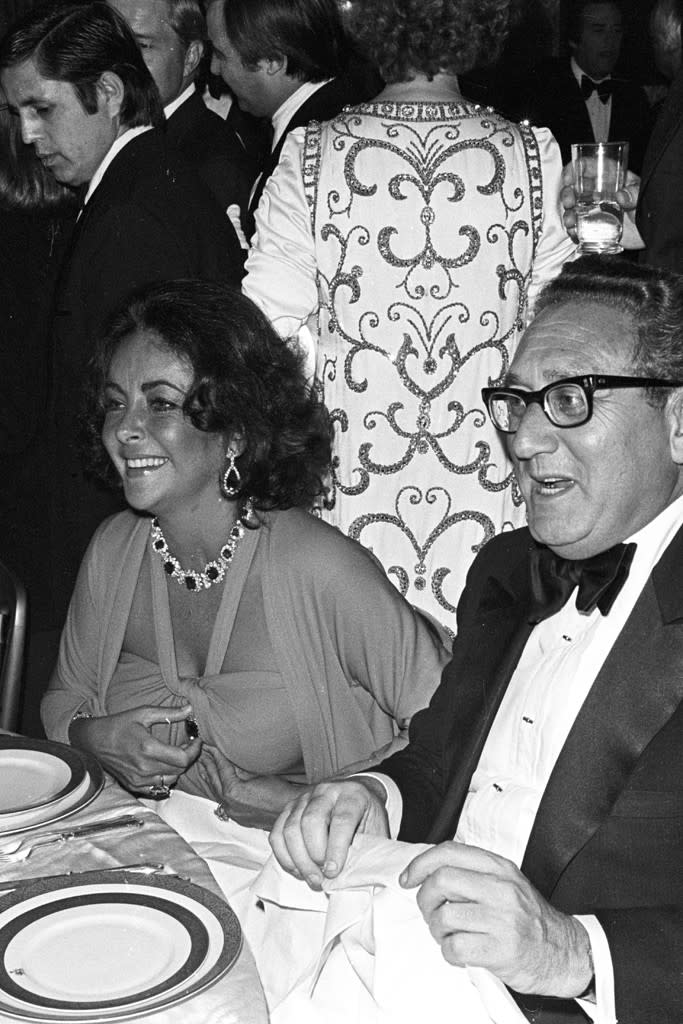Henry Kissinger in the Swinging Seventies
- Oops!Something went wrong.Please try again later.

Former Secretary of State Henry Kissinger died Wednesday at age 100. Here, WWD takes a look back a in its archives at some of the most notable of its many interviews with the famed diplomat. Here, in full, a memorable interview titled “I Wonder Who’s Kissing Now,” from Sept. 8, 1971, written by a HotPants-wearing WWD staffer, Kandy Stroud, as well as photos of Kissinger culled from the paper’s coverage over the years.
More from WWD
Larroudé Launches Colléct, a Boutique of Fashion, Jewelry, Beauty and Wellness Products
Aerosoles to Enter Pants Category in Licensing Deal With Maze Collections
SAN CLEMENTE, CALIF. — Henry Kissinger, sex symbol of the Nixon Administration, steps out of his office onto a sun-drenched San Clemente terrace with a cup of black coffee and sits in a white deck chair with his legs crossed.
The man who has pressured Moscow, drafted State of the World addresses, advised the President to enter Cambodia and paved the road to Red China appears as something of an anachronism in his baggy, midnight blue cotton trousers, black-tie shoes, bright blue unfitted blazer, blue and white striped shirt and striped tie.
“What are you trying to do? Seduce me?” Henry will tease as he notices his visitor’s HotPants. “You know I like these HotPants very much.” Then he’ll light your cigaret, touching your hand as all Continentals do, offer you a cup of coffee and discuss trivia as readily as he would a Sino-Soviet entente.
The impeccably tidy image is perfect for dealing with Alexei Kosygin or Chou En-lai, or lecturing at Harvard, but one cannot help wonder if the movie stars mind that the ankle socks of Washington’s greatest swinger are falling down, that his wiry chestnut hair, which flashes golden in the intense white sunlight, is too close-cropped to run their fingers through or that at least 10 of his 178 pounds protrude over his thin black belt, somehow shortening his 5 feet 9 inches.

RELATED STORY: Kissinger at 90 >>
But suddenly an electric twinkle will flash through the intense blue of his eyes and one catches an inkling of that movie star magnetism … that special quality which causes some people to call him “Cuddly Kissinger.”
Henry is always friendly, particularly with women. Whether on the telephone, at parties or in person, this man who commands more of the President’s attention than almost any other living person, is gentle, boyish, even a bit insecure. And he pays rapt attention to every question as though he had nothing in the world more pressing to consider. Columnist Mary McGrory attests to that.
“Henry is a superb listener, which I think is the secret of his power with the President. He pays total attention. He not only waits until you finish speaking, he gives you time for afterthought and revision.”

When it is Henry’s time to answer, he speaks slowly in deep, mellow Wagnerian tones, carefully weighing words and revising them himself. He is a man to whom semantics are vitally important.
He talks about his job, his hours, his relationship with the President. Foreign policy adviser was not a job Henry sought or expected, he says. After all, he had counseled two Democratic presidents — Johnson and Kennedy — and had a veritable fleet of Democratic friends. Strangely, it was Nelson Rockefeller who suggested Henry take the post.
Henry had been an associate of Rockefeller and was lunching with him in his 54th Street apartment one late November noon in 1968 when Dwight Chapin, the President’s assistant, called and said, “The President-elect would like to see you in his office in Washington on Monday.” Henry thought Mr. Nixon just wanted to discuss foreign policy. “I had no idea he was going to offer me a job.”
And when the offer was made, Henry did not jump at it. “I told him I’d have to think about it.” But Rockefeller persuaded Henry. “He said, ‘Never talk to me again,’ if I didn’t accept. He thought it was my public duty.” Henry dutifully accepted and ever since he’s been working round the clock from the minute he reaches the White House at 7:45 a.m. to the time he leaves (“Never before 8:30 p.m.”).
Two Germans who live next door testify to that dawn departure, but also comment on Henry’s aloofness. “We say, ‘Guten Morgen, Herr Kissinger,’ every morning when we walk our poodle, but he never replies.” Henry says simply, “I’m probably preoccupied.”
And he has every reason to be. He has lived Vietnam every step of the way, masterminded the Cambodian invasion, prepared Mr. Nixon’s State of the World address and paved the way to Communist China. He negotiates with ambassadors, heads of state and visiting dignitaries, wages the President’s war with the Cabinet and fends off the bureaucracy.
Henry probably spends more time than anyone in Washington with the President. He is in the Chief Executive’s office every morning, and sometimes as often as four or five times a day. He dines with him once a week. On trips abroad, he is with the President constantly. Attorney General John Mitchell once told WWD Kissinger sees everything that goes to the President, including reports from the CIA and FBI.
Although Henry denies he sees anything “except those things that concern foreign policy,” he admits he screens whatever messages or reports come from “lower level” department types. Whatever Henry considers irrelevant never reaches the President. “I see everything first to insure there is one central place for followup so the President doesn’t have so many balls to juggle.”

Sources also say Henry monitors his phone calls with the President — but Henry denies that too. “I simply keep a log of my schedule, of whom I talk to and what I talked to them about so I can refer back should problems arise.”
He describes the President as “detached, precise, analytical and easy to work for,” and says “when it comes to foreign policy, he never shows impatience.”
Henry scuttles away from the subject of Vietnam except to assert that he does not believe war has “a positive side. It is, at best, the lesser of two evils.” And he generalizes about China. “I was very moved and impressed by my experience. I look forward to returning so I can see the countryside and meet some of the ordinary people.” He will not discuss his background as he does with friends who sit next to him at dinner parties either. But those friends tell you that Henry’s past was not easy. Henry was not always the swinging single he is today.
He was born May 27, 1923, into a Jewish middle class family in Furth, just outside Nuremberg, and from 1930-38 during the Nazi occupation, Henry was a social outcast. He was kicked out of his school by the Nazis, forced to attend an all-Jewish school, and was often beaten up along the way. He was forbidden to use the public swimming pools or to mingle with other German youths. Eleven members of his family died by Nazi hands.
By the time Henry escaped to the United States with his parents he had become a withdrawn, suspicious young man. At George Washington High School on New York’s Upper West Side, he avoided his classmates. Henry would cross to the other side of the street when he saw a group of his peers approaching.
“He was totally withdrawn,” says Fritz Kraemer, director of a military government school for officers of the 84th Division of the U.S. Army, which Henry entered as a private in 1943. (It was Kraemer who discovered Henry’s extraordinary mind and advised him to continue his education. Henry’s greatest desire in life until then had been to become an accountant.)
In 1949, Kissinger married Ann Fleischer, who also had come to this country from Germany. The marriage lasted until 1964, when they were divorced.
When Henry went to Harvard his intellectual enlightenment began, but the social awakening did not. “He was a total introvert,” says a classmate, “brilliant but shy. It’s hard to understand his popularity now.”
Henry avoids that topic, but when it comes to discussing his life as “Playboy of the Western Wing,” he lights up. It is a subject that has great appeal to him. As someone who has known him for 15 years says, “Henry likes to believe that although he’s a serious Germanic scholar, he’s really a frivolous playboy, that he’s Metternich, the Papillion, light, gay and 18th Century.”
In fact if you ask Henry how he likes being called “Washington’s greatest swinger,” he replies unabashedly, “That’s no compliment. That’s faint praise.” Tease him about the bells in Jill St. John’s alarm system going off recently when Henry and Jill walked out to her pool and he’ll say, “What did you expect? … I was teaching her chess.” Or ask him if he likes Washington’s social merry-go-round and he answers, “You haven’t exactly seen me avoiding it have you?”
Although he’ll tell you the only thing he dislikes about his present notoriety is that everyone is constantly staring to see which star he is with, there are those who suggest Henry not only loves to be seen, but even had photographers notified when he was going to appear at a certain restaurant once.
Just a couple of nights ago, Henry was in the news when a TV report had him “secretly married” to Jill St. John. Henry and Jill each denied it.
“There has never been a romance,” Jill told WWD. “It has been a great friendship and still is. It has not been and will never be a great romance.”
“Of course, I’m not married,” snapped Henry. “Do you believe everything you hear on TV?”
Henry says, “I like women who are intense, intelligent and warm. And any woman who survives with me has to be very independent. It would be suicide for a woman to try and find identity through a man absolutely absorbed in his work.”
Yet he will not delineate those qualities which attracted so many women to him. “Maybe it’s my deep voice,” he says with a mischievous grin. “You’re a woman. Am I attractive to you?”
Henry is certainly attractive to some people, if it not for his Tarzan physique, then certainly for his gifted mind, quick wit and adaptability. Joyce Haber, the society columnist he often visits on the West Coast, says: “In his brilliance Henry has a way of adjusting to any level. He can adapt to anybody. He is worldly, humorous, sophisticated and a cavalier with women.” Barbara Howar says, “I have great respect for him as a human being.” Gloria Steinem says, “Henry’s the only interesting person in the whole Nixon Administration and he’s not afraid of hostile reporters. I enjoy talking with him. He’s the only person on the Nixon team who can talk.”
And although Gloria adds, “If this were the Kennedy Administration nobody would pay attention to him … if it weren’t for a vacuum of news, Henry would be forgotten.” Margot Hahn, wife of D.C. Council chairman Gilbert Hahn, disagrees. Margot calls Henry, “witty, funny and one of the smartest men I ever met. He’d endure in any administration. He can be light and gay, and talk about anything at all. He reads everything including all the silly stuff in the gossip columns about him or about me, which he thinks is a gas, and he loves to be teased. I absolutely adore to be with him. He’s a delightful man.”
Henry brushes off the phrase, but concurs that he reads a great deal. He has been concentrating on Chinese philosophy and history these days and has not yet had a crack at “The Sensuous Man.” He does, however, get a chance to “look at the pictures” in Playboy. (Hugh Hefner sent Henry a free subscription after a party at Barbara Howar’s at which he showed up carrying an envelope of classified information — the President’s Nov. 3, 1969, “silent majority” speech — and told everybody it was his copy of Playboy.)
As Margot Hahn says, Henry will indeed talk about almost anything, even an affair. He’ll tell you the best way to begin one is “with an intense conversation” and that the best way to end one is “abruptly … but always remain friends.” He’ll tell you he gets his clothes at Brooks Bros. in New York but also has some custom made. He’ll tell you he realizes he is overweight, but that his 165-pound figure has rounded out to a somewhat paunchy 178, partly because he enjoys good food at good restaurants, but mostly because he devoured every morsel of Chou Enlai’s cuisine on his recent trip to China.
“And I absolutely adore Chinese food, particularly Peking duck,” says Henry, who proudly owns up to having downed a 26-course “duck” dinner at Chou’s. He is now “trying to reduce” to repent for his overindulgence and attempts to eat one egg, half a slice of toast and black coffee at the White House mess for breakfast, a hamburger at his desk for lunch and a steak for dinner at the Sans Souci or Jockey Club.
He’ll also tell you he exercises an hour at a clip four or five times a week at the White House health spa in the Executive Office Building, and that he used to be a “night” person and did all his work between afternoon and midnight, but now he is both a “day” and “night” person.
But there are many areas Henry will not touch on, and if he does not wish to answer, he’ll wriggle out of a question with a deadpan face and wry remark. For example: How do you relax? “I crochet.” What do you and Jill St. John like to do together? “I’m teaching her chess.” Why don’t you give interviews? “Look what mystery did for Greta Garbo.” Why did the President send you instead of Secretary of State William Rogers to China? “He knows I like wonton soup.” What abut God? “That would take six volumes.” Will you write a book? “No, I know too much.”
It is as though he wishes to be known and yet to remain unknown, as though one half of Henry cautions him constantly against saying too much. Henry jokes about his two sides, blaming it on his sign of the Zodiac, Gemini: “I’m a schizophrenic.” But columnist Joe Kraft links it to Henry’s innate “suspicion” of others. “He’s afraid he’s going to say something and it’s going to get him in trouble. He’s afraid. He’s really not a relaxed man at all.”
When Henry wants to end a conversation, he can sometimes use his children as an excuse, and when he does, a totally new side of Henry Kissinger emerges. He’ll introduce you to Elizabeth, 12, wearing a black T-shirt and slacks. She has Henry’s curly hair, only darker, and her eyes are brown. Then he’ll introduce you to 10-year-old David, who looks like a German choir boy with shoulder-length, curly white-blonde hair and Henry’s piercing blue eyes.
“This is my Beatle,” Henry will say, tousling David’s curls, proudly examining the sketch of a long-haired rock star David has just completed with considerable skill.
“He’s an excellent painter too,” says Henry. “Except he ruins all my relationships with movie stars. I once introduced him to Lana Turner and he said, ‘Who’s that?’”
Then Henry heads for Disneyland with the two kids in tow, and suddenly “the playboy of the western wing” becomes a much more familiar entity.
Henry Kissinger in the Swinging Seventies: Photos Through the Years



Launch Gallery: Henry Kissinger in the Swinging Seventies: Photos Through the Years
Best of WWD

